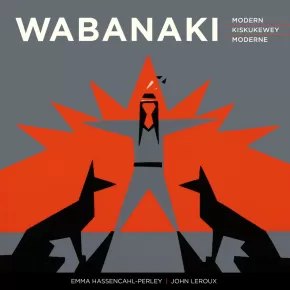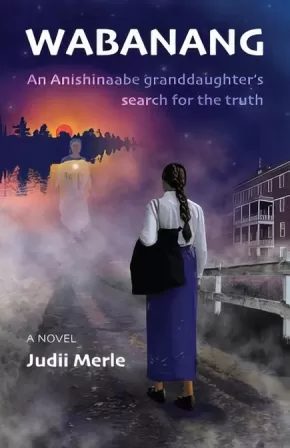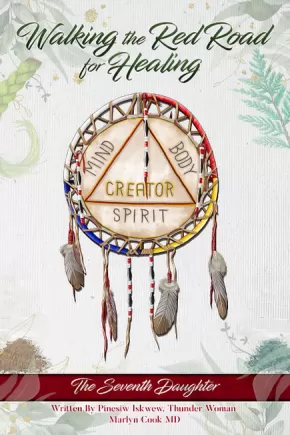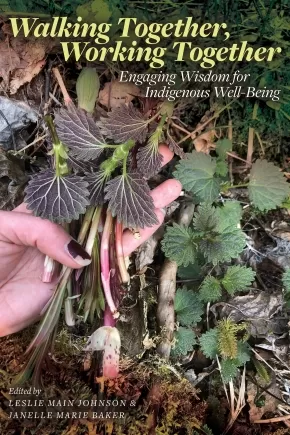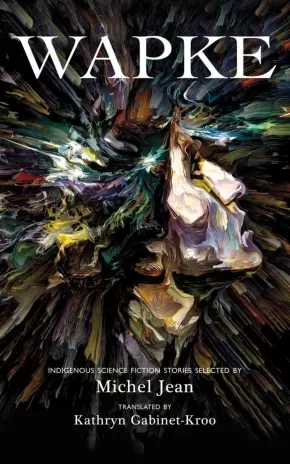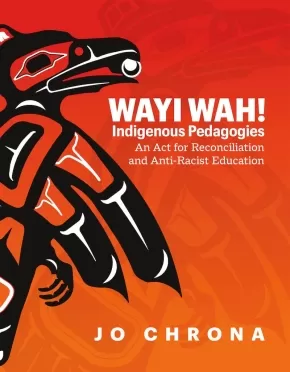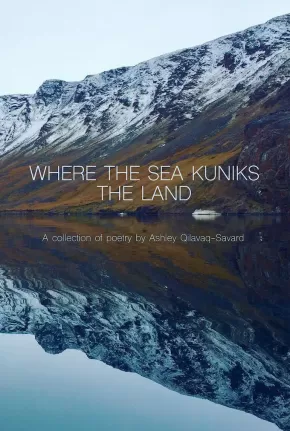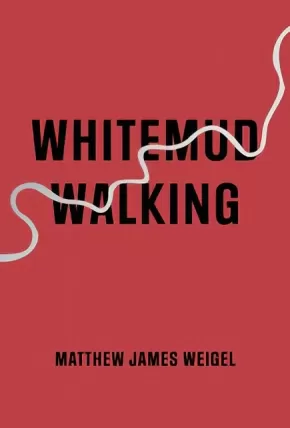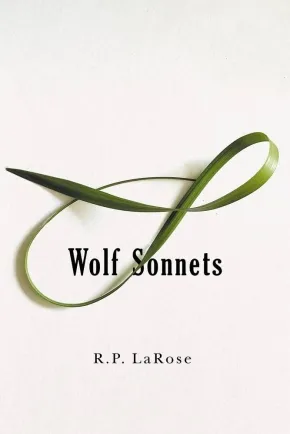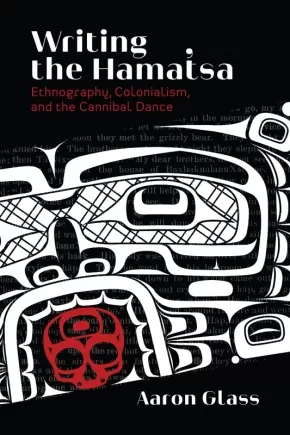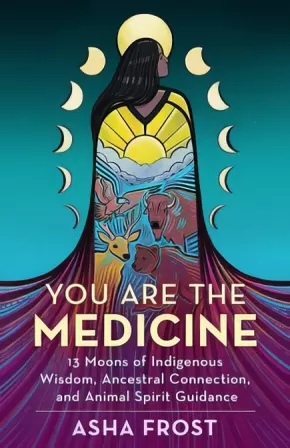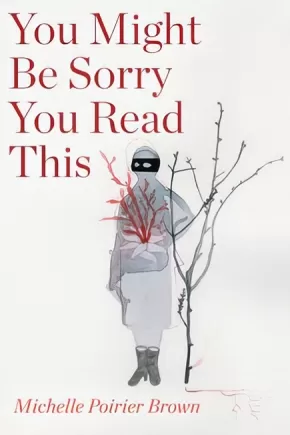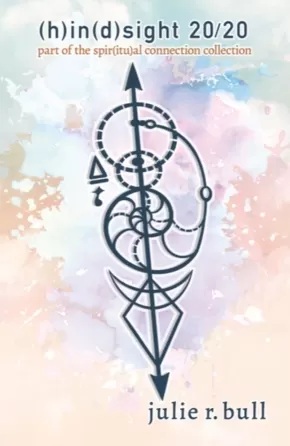Indigenous Peoples in Canada
Synopsis:
The story of an overlooked group of cultural visionaries
The “Micmac Indian Craftsmen” of Elsipogtog (then known as Big Cove) rose to national prominence in the early 1960s. At their peak, they were featured in print media from coast to coast, their work was included in books and exhibitions — including at Expo 67 — and their designs were featured on prints, silkscreened notecards, jewelry, tapestries, and even English porcelain.
Primarily self-taught and deeply rooted in their community, they were among the first modern Indigenous artists in Atlantic Canada. Inspired by traditional Wabanaki stories, they produced an eclectic range of handmade objects that were sophisticated, profound, and eloquent.
By 1966, the withdrawal of government support compromised the Craftsmen's resources, production soon ceased, and their work faded from memory. Now, for the first time, the story of this groundbreaking co-operative and their art is told in full. Accompanying a major exhibition at the Beaverbrook Art Gallery opening in 2022, Wabanaki Modern features essays on the history of this vibrant art workshop, archival photographs of the artisans, and stunning full-colour images of their art.
Wla atukuaqn na ujit ta'nik mu ewi'tamuki'k tetuji kelulkɨpp ta'n teli amaliteka'tijik
Wla “Mi'kmewaqq L'nue'k amaliteka'tijik” tlo'ltijik Elsipogtog (amskweseweyekk i'tlui'tasikɨpp Big Cove) poqji wuli nenupnikk wla amaliteka'tijik 1960ekk. Je wekaw wutlukowaqnmuwow ika'tasikɨpp wikatikniktuk aqq ne'yo'tasikɨpp ta'n pukwelk ta'n wen nmitew — je wekaw Expo 67 — aqq ta'n koqoey kisi napui'kmi'tipp tampasɨk koqoey eweketu'tij stike' l'taqnewi'kasik, napui'kn misekn, wi'katikne'ji'jk, meko'tikl kuntal, kaqapitkl l'taqa'teke'l, aqq wekaw akalasie'we'k eptaqnk. Nekmow na kekina'masultijik aqq melki knukwi'tij ta'n tett telayawultijik, nekmow na amskewsewa'jewaqq l'nu'k tel nenujik ujit ta'n teli amaliteka'tijik ujit Atlantic Canada. Pema'lkwi'titl a'tukuaqnn ta'n sa'qewe'l, ta'n wejiaqel a'tukuaqnn Wabanaki, l'tu'tipp kaqasi milamu'k koqowey toqo eweketu'titl wutpitnual tetuji moqɨtekl, ma'muntekl, aqq weltekl.
Wekaw 1966ekk, kpno'l pun apoqnmuapni wla amaliteka'tikete'jɨk jel kaqnma'tijik ta'n koqoey nuta'tipp, amuj pana pun lukutipnikk, aqq tel awantasuwalutki'k. Nike', amskwesewey, wla a'tukuaqn tetuji msɨki'kɨpp wla wut lukewaqnmuwow etel kaqi a'tukwasikk. Wije'tew meski'k neya'tmk Beaverbrook Art Gallery pana'siktetew 2022al, Wabanaki Modern na pema'toql wikikaqnn ujit ta'n pemiaqɨpp wla tetuji wulamu'kɨpp kisitaqnne'l telukutijik, maskutekl sa'qewe'l napuikasikl toqo nemu'jik etl-lukutijik wla lukewinu'k, aqq sikte wultek aqq welamu'k ta'n koqoey kisitu'tij.
L'histoire d'un groupe de visionnaires culturels ignorés
Un groupe d'artisans mi'kmaw d'Elsipogtog (autrefois Big Cove) au Nouveau-Brunswick se fit connaître à travers le Canada au début des années 1960. À l'apogée de leur renommée, les Micmac Indian Craftsmen firent l'objet d'articles dans des publications d'un océan à l'autre. Leur travail figura dans des livres et des expositions — dont Expo 67 à Montréal — et leurs œuvres graphiques furent reproduites sous forme de gravures et de sérigraphies, et elles ornèrent de la papeterie, des bijoux, des tapisseries et même de la porcelaine anglaise.
En grande partie autodidactes et solidement enracinés dans leur communauté, les Micmac Indian Craftsmen furent parmi les premiers artistes autochtones modernes au Canada atlantique. En s'inspirant de récits traditionnels wabanakis, ils fabriquaient à la main une gamme variée d'objets raffinés, évocateurs et porteurs d'un sens profond.
En 1966, toutefois, le gouvernement retira son soutien. Les Craftsmen perdirent leur financement, la production cessa peu après et leur œuvre finit par être oubliée. Une nouvelle publication relate maintenant, pour la première fois, l'histoire complète de cette coopérative innovatrice et de ses réalisations. Publié dans le cadre d'une grande exposition qui a lieu à la Galerie d'art Beaverbrook en 2022, Wabanaki Moderne comprend des textes sur l'histoire de cet atelier dynamique, des photographies d'archives des artisans et de superbes illustrations couleur de leurs œuvres.
Educator Information
Delivered in three languages: English, Mi'kmaw, and French
Additional Information
228 pages | 10.00" x 10.00" | Paperback | 96 Colour Reproductions and Photos, 26 Black and White Illustrations and Archival Photos
Synopsis:
In the winter of 1876, a baby is born to Anishinaabe parents along the trapline in the northern Ontario wilderness. Seventy-five years later, her granddaughter is seeking information about her grandmother's life, why her family is so fractured, and what part the residential school played in the dysfunction and estrangement which has shaped her own life. To that end, twenty—two-year-old Janey enlists the help of a hypnotist who regresses Janey back to a time when Indigenous people in Canada lived off the land, supported each other and raised their children without outside interference. But when settlers began to arrive and residential schools were established, all that changed.
In her hypnotic state, Janey is able to follow her grandmother, Wabanang (Morning Star) as a child, as a residential school student and as a medicine woman for her people. But the seeds of distrust and fear sown along the way are destroying her family. Estranged from her mother and living with her only relative, Janey must find her own way through the smoke of confusion to discover who she is.
Although this is a work of fiction. The author has drawn on her own family's history, ceremonies and visions from her own life, stories shared with her by respected elders, as well as many years of researching her own and other families.
Additional Information
232 pages | 5.51" x 8.46" | Paperback
Synopsis:
Pinesiw Iskwew, Thunder Woman, Dr. Marlyn Cook, member of Misipawistik Cree Nation is the author of Walking the Red Road for Healing. This book is based on her life and journey as a Cree Woman, Pipe Carrier, Sundancer, Sweat Lodge Keeper, and medical doctor (graduate MD 1987). She believes the approach for healing must be holistic and that our Traditional Healers work alongside physicians in our Indigenous communities. Dr. Marlyn Cook shares her own experiences of colonialism and how this affected her, her family and her community. Through her reflections of her Indigenous Knowledge, her Traditional Teachings of Ceremonies and Medicines, she acknowledges the resilience of communities in their healing and provides ways to heal. Dr. Cook’s intention in this powerful book is to bring us together in Truth and Reconciliation. This book will resonate with health, social, and justice prac
Educator Information
Keywords / Themes: Adult Education, Health & Healing, Traditional Teachings, Indigenous Knowledge, Truth and Reconciliation.
Additional Information
Pages: 200 | Paperback
Synopsis:
This collection takes a holistic view of well-being, seeking complementarities between Indigenous approaches to healing and Western biomedicine. Topics include traditional healers and approaches to treatment of disease and illness; traditional knowledge and intellectual property around medicinal plant knowledge; the role of diet and traditional foods in health promotion; culturally sensitive approaches to healing work with urban Indigenous populations; and integrating biomedicine, alternative therapies, and Indigenous healing in clinical practice. Throughout, the voices of Elders, healers, physicians, and scholars are in dialogue to promote Indigenous community well-being through collaboration. This book will be of interest to scholars in Indigenous Studies, medicine and public health, medical anthropology, and anyone involved with care delivery and public health in Indigenous communities.
Contributors: Darlene Auger, Dorothy Badry, Margaret David, Meda DeWitt, Hal Eagletail, Gary L. Ferguson III, Marc Fonda, Annie Goose, Angela Grier (Pioohksoopanskii), Leslie Main Johnson, Allison Kelliher, Patrick Lightning, Mary Maje, Maria Mayan, Ruby E. Morgan, Richard T. Oster, Ann Maje Raider, Camille (Pablo) Russell, Ginetta Salvalaggio, Ellen L. Toth, Harry Watchmaker
Additional Information
272 pages | 6.00" x 9.00" | Paperback
Synopsis:
Indigenous and non-Indigenous scholars forward child welfare issues currently impacting Indigenous children in Canada.
Developed by the Prairie Child Welfare Consortium, this edited collection brings together accomplished Indigenous and non-Indigenous scholars from the prairie provinces to forward critical research about a range of contemporary child welfare issues currently impacting Indigenous children in Canada.
Centering Indigenous knowledge and working to decolonize child welfare, contributors address the over-representation of Indigenous children in the child welfare system, the un-met recommendations of the TRC, the connections between colonialism and fetal alcohol spectrum disorders, the impact of Bill C-92, and more.
Contributors include: Jason Albert, Dorothy Badry, Cindy Blackstock, Elder Mae Louise Campbell, Peter Choate, Linda Dano-Chartrand, Michael Doyle, Koren Lightning Earle, Arlene Eaton Erickson, Yahya El-Lahib, Hadley Friedland, Don Fuchs, Del Graff, Jennifer Hedges, Bernadette Iahtail, Jennifer King, Brittany Mathews, Eveline Milliken, Kelly Provost—Ekkinnasoyii (Sparks in a Fire), Christina Tortorelli, Gabrielle Lindstrom Tsapinaki, Susannah Walker, and Robyn Williams
Reviews
“A great contribution for all of us who conduct research, teach, and work directly in the field of Indigenous child welfare practice.”—Jeannine Carrière, author of Calling Our Families Home: Métis Peoples’ Experiences with Child Welfare
Additional Information
288 pages | 5.00" x 7.50" | Paperback
Synopsis:
Wapke—meaning “tomorrow” in the Atikamekw language—is Quebec’s first collection of science fiction short stories by Indigenous writers. Fourteen authors from various nations and different backgrounds project us into the future through their moving, poetic, worrying, and sometimes fantastical tales, addressing current social, political, and environmental themes. From time travelling Indigenous warriors to rebellious language and knowledge keepers, from Big Trees in a lake to a human sausage factory, from living on the land to living in cyberspace, these stories provide a trans-Indigenous colonial critique. The brainchild of Michel Jean, Wapke can be read on different levels: as pure entertainment for sci-fi fans or as a stimulant to serious reflection. It offers an often-captivating social commentary that reveals how Indigenous people view the future as well as a hope that change will come.
Educator Information
This book is available in French: Wapke
Additional Information
160 pages | 5.00" x 8.00" | Paperback
Synopsis:
Extend your learning to explore how racism and bias are embedded in education systems, as well as our own perspectives—and how to create equitable education for all learners.
How can Indigenous knowledge systems inform our teaching practices and enhance education? How do we create an education system that embodies an anti-racist approach and equity for all learners?
This powerful and engaging resource is for non-Indigenous educators who want to learn more, are new to these conversations, or want to deepen their learning.
Some educators may come to this work with some trepidation. You may feel that you are not equipped to engage in Indigenous education, reconciliation, or anti-racism work. You may be anxious about perpetuating misconceptions or stereotypes, making mistakes, or giving offence. In these chapters, I invite you to take a walk and have a conversation with a good mind and a good heart.
With over two decades in Indigenous education, author Jo Chrona encourages readers to acknowledge and challenge assumptions, reflect on their own experiences, and envision a more equitable education system for all. Each chapter includes:
- reflection questions to help process the ideas in each chapter
suggestions for taking action in both personal and professional spheres of influence - recommended resources to read, watch, or listen to for further learning
- personal reflections and anecdotes from the author on her own learning journey
- voices of non-Indigenous educators who share their learning and model how to move into, and sit, in places of unknowing and discomfort, so we can examine our own biases and engage in this work in a good way
Grounded in the First Peoples Principles of Learning, this comprehensive guide builds on Chrona’s own experiences in British Columbia’s education system to explore how to shape anti-racist and equitable education systems for all.
Perfect for reading on your own or with your professional learning community!
Educator Information
Table of Contents
1 Where Do We Begin? Setting Up Our Space in A Good Way
- Situating Ourselves
- An Invitation
- Some Structural Guidance as You Read
- Discomfort: Moving Through the Fear of Making Mistakes
- Taking Responsibility
2 Indigenous Education Is Not Multicultural Education
- Defining Indigenous Education
- Culturally Responsive Education and Beyond
3 Yes, You Have a Role: Reconciliation Through Education
- Our Collective Responsibility
- This Is Not “Just History”; This Is Now
- Colonization Past and Present
- Reconciliation Through Education
- A Vision of a System
4 So, Let’s Talk About the R Word
- Begin With Honesty
- Becoming Anti-Racist in Canada
- Investigating Our Own Biases and Assumptions
- How We Define Racism Matters
- Relational Racism
- Systemic Racism
- Learning and Growing
5 An Indigenous-Informed Pedagogy: The First Peoples Principles of Learning
- Moving From “Learning About” to “Learning From”
- How Were the FPPL Identified?
- What Is Important to Know About the FPPL?
- A Closer Look at Each Principle
- Current Contexts
6 Authentic Indigenous Resources
- Voice and Representation
- Authentic Resource Evaluation Criteria
- Collaborative Development of Local First Nations, Inuit, and Métis Resources
7 A Story of One System: Indigenous Education in British Columbia
- On a Learning Journey
- The Power of Indigenous Advocacy and United Voice
- Government Commitments and Obligations
- Bumpy Paths
8 Now What?
- Next Steps
- Final Thoughts: Working in Relation
References
Additional Information
232 pages | 7.00" x 9.00" | Paperback
Synopsis:
A “kunik” is a traditional Inuit greeting, often given to loved ones, in which a person places their nose on another’s cheek and breathes them in. Where the Sea Kuniks the Land extends that gesture of love to the Arctic landscape, in a suite of poems that celebrates the interconnectedness of people and place, past and present.
The importance of land, culture, and identity play key roles in these poems, and the collection will move readers to think deeply about colonization, intergenerational trauma, and grief.
This collection paints beautiful pictures of Arctic landscapes, love stories, and growth. It will take readers on a journey through the seasons, from fierce snowstorms to a warm field of Labrador tea flowers.
Additional Information
80 pages | 7.00" x 9.25" | Paperback
Synopsis:
An Indigenous resistance historiography, poetry that interrogates the colonial violence of the archive
Whitemud Walking is about the land Matthew Weigel was born on and the institutions that occupy that land. It is about the interrelatedness of his own story with that of the colonial history of Canada, which considers the numbered treaties of the North-West to be historical and completed events. But they are eternal agreements that entail complex reciprocity and obligations. The state and archival institutions work together to sequester documents and knowledge in ways that resonate violently in people’s lives, including the dispossession and extinguishment of Indigenous title to land.
Using photos, documents, and recordings that are about or involve his ancestors, but are kept in archives, Weigel examines the consequences of this erasure and sequestration. Memories cling to documents and sometimes this palimpsest can be read, other times the margins must be centered to gain a fuller picture. Whitemud Walking is a genre-bending work of visual and lyric poetry, non-fiction prose, photography, and digital art and design.
Awards
- 2023 Indigenous Voices Awards Co-Winner: Published Poetry in English
Additional Information
144 pages | 5.75" x 8.50" | Paperback
Synopsis:
In his commanding poetry debut, Wolf Sonnets, R. P. LaRose undoes the sonnet's classical constraints, retooling the form for current political circumstances. Packed with family lore, these poems reflect on how deeply we can trust the terms we use to construct our identity. A proud citizen of the Métis Nation, LaRose even questions his right to identify as such: "I was made in someone else's home," he writes. Wolf Sonnets is verse obsessed with names, infinity, numbers, categories, and interconnectedness. Depicting his ancestors as wolves--symbols of survival and protection--LaRose brings fresh insight to his wider poetic project: castigating the inequality, greed, and racism inherent to colonialism.
Additional Information
80 pages | 5.00" x 7.50" | Paperback
Synopsis:
Poets, both settler and Indigenous, pay tribute to trees through reflections on the past, connections to the present, and calls for the protection of our future.
In Worth More Standing: Poets and Activists Pay Homage to Trees, celebrated poets and activists pay homage to the ghosts of lost forests and issue a rallying cry to protect remaining ancient giants and restore uncolonized spaces.
Themes of connection, ecology, grief, and protection are explored through poems about trees and forests written by an impressive number of influential poets, several of whom have attended the recent Fairy Creek blockades and still others who defended BC's old growth trees in Clayoquot Sound nearly 30 years ago.
Contributors include ninth Parliamentary Poet Laureate Louise Bernice Halfe-Sky Dancer, GG winner Arleen Paré, Canadian icon bill bissett, Griffin Poetry Prize winner Eve Joseph, ReLit Award winner Patrick Friesen, Joy Kogawa, Fiona Tinwei Lam, Harold Rhenisch, Jay Ruzesky, John Barton, Kate Braid, Kim Trainor, Kim Goldberg, Pamela Porter, Patricia and Terence Young, Russell Thornton, Sonnet L’Abbé, Susan McCaslin, Susan Musgrave, Tom Wayman, Trevor Carolan, Yvonne Blomer, Zoe Dickinson and the late Pat Lowther.
Reviews
"This anthology grounds us in the earth's daily miracles, also known as trees, reminding us not to take them for granted. These poems acknowledge how we rely on and are part of a life force much bigger and wiser than us, giving us glimpses into the sacredness that trees make as they unconditionally transform sunlight into 'nourishing air.' From love to grief to gratitude to awe, this collection gives us lessons in the language of trees, crucial lexicons with which to navigate climate emergency." -Rita Wong, activist-poet, author of Current, Climate: The Poetry of Rita Wong
"In this eclectic grove of poems written and gathered on the body of trees, poets inflect, root, bend towards the mythopoetic, listening with love to arboreality, walking the path towards tree immersion. 'Make no mistake, I saw them relax their limbs and droop. Settling into their dreams.' A language that will always mystify and sustain us. Enjoy this collection and touch wood. 'tree, tell me what have you done with death.' 'today i ate chainsaws for breakfast.'" -Mona Fertig, editor of Love of the Salish Sea Islands and 111 West Coast Literary Portraits
"The tree is in the midst of an intellectual renaissance, judging by all the books on the lifeways, politics and communicative tendencies of networked forests. But poets have always been a People of the Tree, and the arboreal fund gathered in Worth More Standing covers the roots and branches of the entwined process of 'becoming both human and tree.' Our fate and the fate of forests have never been more entangled. This is a gorgeous and necessary collection, to be returned to again and again."-Governor General's Award-nominated poet Stephen Collis
"A masterpiece in cultural diversity unified with a call to action, Worth More Standing is a celebratory awakening to all Earth Citizens to see trees as far more valuable than in board feet of lumber. Our unified purpose must be to honour the old growth as we would our ancestors. Such forests and trees have been with us as long as we have been human. Their destruction means the loss of an essential component of our humanity." -Paul Stamets, award-winning mycologist, author, and bee protector
Additional Information
240 pages | 6.00" x 9.00" | Paperback
Authenticity Note: Not all of this work's contributors are Indigenous.
Synopsis:
Long known as the Cannibal Dance, the Hamat̓sa is among the most important hereditary prerogatives of the Kwakwa̱ka̱ꞌwakw of British Columbia. Writing the Hamat̓sa offers a critical survey of attempts to record, describe, and interpret the dance under shifting colonial policy. In the late nineteenth century, as anthropologists arrived to document the practice, colonial agents were pursuing its eradication and Kwakwa̱ka̱ꞌwakw were adapting it to ensure its survival. In the process, the dance – with dramatic choreography, magnificent bird masks, and an aura of cannibalism – entered a vast and variegated library of ethnographic texts.
Drawing on close, contextualized reading of published texts, extensive archival research, and fieldwork, Aaron Glass analyses key examples of overlapping genres over four centuries: the exploration journal, the territorial survey, the missionary polemic, settler journalism, government reports, anthropological works (especially by Franz Boas and George Hunt), poetry, fiction, and Indigenous (auto)biography.
Going beyond postcolonial critiques of representation that often ignore Indigenous agency in the ethnographic encounter, Writing the Hamat̓sa focuses on forms of textual mediation and Indigenous response that helped transform the ceremony from a set of specific performances into a generalized cultural icon. This meticulous work illuminates how Indigenous people contribute to, contest, and repurpose texts in the process of fashioning modern identities under settler colonialism.
This comprehensive critical survey of ethnographic literature on the Hamat̓sa ceremony will be an invaluable resource for scholars and students of the Northwest Coast in a range of disciplines – Indigenous studies, anthropology and history of anthropology, ethnohistory, BC studies, art history, museum studies, and material culture – as well as for Kwakwa̱ka̱ꞌwakw/Indigenous readers.
Educator Information
Table of Contents
Foreword / Chief William Cranmer/T̓łlakwagila (ꞌNa̱mg̱is Nation)
Prologue: Points of Arrival and Departure
Introduction: From Writing Culture to the Intercultural History of Ethnography
1 A Complex Cannibal: Colonialism, Modernity and the Hamat̓sa
2 Discursive Cannibals:The Textual Dynamics of Settler Colonialism, 1786–1893
3 The Foundations of All Future Researches: The Work of Franz Boas and George Hunt, 1886–1966
4 Reading, Rewriting, and Writing Against: Changing Anthropological Theory, 1896–1997
5 From Index to Icon: (Auto)Biography and Popular Culture, 1941–2012
6 Reading Culture, Consuming Ethnography
Afterword: Between This World and That / Andy Everson/Tanis (K̕ómoks Nation)
Appendices
Glossary
Notes; References; Index
Additional Information
512 pages | 6.00" x 9.00" | 28 b&w photos, 2 maps | Paperback
Synopsis:
Indigenous Medicine Woman Asha Frost invites readers to learn the healing medicine of the 13 Ojibway moons and the spirit animals that will guide their wisdom journey.
If you are drawn to Indigenous Medicine ways, you, too, have power and beauty in your own lineage waiting to be discovered.
Follow the path of the 13 Ojibway moons with animal spirits as your guides to unlock powerful teachings that will help you directly experience your own medicine connection to your inherent healing powers. If you feel you don't have access to your roots, ancestors, or spiritual connection and you look outside of yourself for answers, you are forgetting the medicine you need lives within you.
Through storytelling, personal reflections, ceremonies, rituals, and shamanic journeys, readers will learn to apply ancient wisdom and ancestral medicine to their own lives in meaningful ways that are respectful and conscious of the stolen lands, lives, and traditions of Indigenous peoples.
Discover how to:
• Ground and root into your own lineage and your ancestral guides.
• Connect to spirit and your innate healing powers in your own unique way.
• Practice self-care and rest on your journey.
• Return ancestral ways of cleansing and purifying.
• Trust and surrender in order to manifest.
• Remember your dreams and use them in your daily life.
• Release self-doubt, fear, disconnection, and insecurity.
Additional Information
280 pages | 5.50" x 8.50" | Paperback
Synopsis:
You Might Be Sorry You Read This is a stunning debut, revealing how breaking silences and reconciling identity can refine anger into something both useful and beautiful. A poetic memoir that looks unflinchingly at childhood trauma (both incestuous rape and surviving exposure in extreme cold), it also tells the story of coming to terms with a hidden Indigenous identity when the poet discovered her Métis heritage at age 38. This collection is a journey of pain, belonging, hope, and resilience. The confessional poems are polished yet unpretentious, often edgy but humorous; they explore trauma yet prioritize the poet’s story. Honouring the complexities of Indigenous identity and the raw experiences of womanhood, mental illness, and queer selfhood, these narratives carry weight. They tell us “You need / only be the simple / expression of the divine / intent / that is your life.” There is a lifetime in these poems.
Reviews
"Michelle Poirier Brown’s first collection of poetry is accomplished and gripping. In her five-decade story, perceptions, denial, emotional embroilments and poignant tenderness are peeled back and examined. As the narrative builds, we encounter the sheer alchemical power of poetry. This is rare. You Might Be Sorry You Read This will change you." — Betsy Warland, Bloodroot—Tracing the Untelling of Motherloss
“One of the functions of poetry is to make you uncomfortable.” This epigraph, by Pádraig Ó Tuama, begins Michelle Poirier Brown’s debut collection—a collection that intends, unapologetically, to discomfort the reader. With unflinching precision and the exactness of a fine poet’s eye, Poirier Brown challenges her readers to encounter not only her childhood trauma but, ultimately, the power of her self—her late-discovered Métis identity, her navigation of PTSD, her unwillingness to settle for less than the truth. In the final poem, “Self-Portrait of the Poet,” she concludes, “go ahead. look. / Look as long as you like.” Invitation or command, it’s a hard look Poirier Brown offers. It may make readers uncomfortable. But they won’t be sorry.” —Laura Apol, author of A Fine Yellow Dust
Educator Information
Keywords / Themes: Identity, Trauma, Pain, Resilience, Family, Métis, Indigenous.
Table of Contents
1 The Father I Had
3 God Was a Baby
4 A Child’s Book of Holy Services
6 Her Breath on My Face
8 Other Side of the Glass
10 Effect on Her Throat
11 The House on Strathnaver Avenue
15 Mothers Who Know
16 The Thing About Snow
22 Photograph
23 Under the Covers
25 The Girls I Grew Up With Are Everywhere
27 Short Change
28 After the Test
29 Walk on the Left-Hand Side
30 5:53 PM
32 A Perspective on Women
33 Collard Greens
34 Lasts
36 I’m Allowed to Have Whatever Kind of Father I Want
38 Intimacy
39 On the Porch
41 At Times, My Teeth Chatter
about face
46 What It’s Like to Have My Face
47 Understanding My Face
52 Wake
54 A Fragile Defiance
55 Smoke
57 Winnipeg Trip
59 Commitment
61 Two Mornings, 2018
63 Boxed
64 Those I Call Friends
66 Duck Ugly
67 Beneficiaries of a Genocide
69 Slow
70 Sometimes You Learn Things Quite Late in the Game
72 Something Purple
75 what it is like to be this extreme and appear normal
78 The Other Grandmother
80 Self-Portrait of the Poet
83 addendum
87 poetic statement
90 acknowledgements
Additional Information
104 pages | 6.00" x 9.00" | Paperback
Synopsis:
J. R. Bull’s debut poetry book, (h)in(d)sight 2020, is the first in the Spir(itu)al Connection Collection. Julie’s lyrical and whimsical use of language provides ponderings for readers as they are taken on a journey of self-discovery. Part - memoir, manifesto, and musings, (h)in(d)sight 2020 is an inward journey and an outward Call to Action. A heart and soul voyage toward decolonization of the mind. Challenging the status quo and perceived societal norms, (h)in(d)sight 2020 demonstrates moving forward, together.
Additional Information
58 Pages | Paperback

